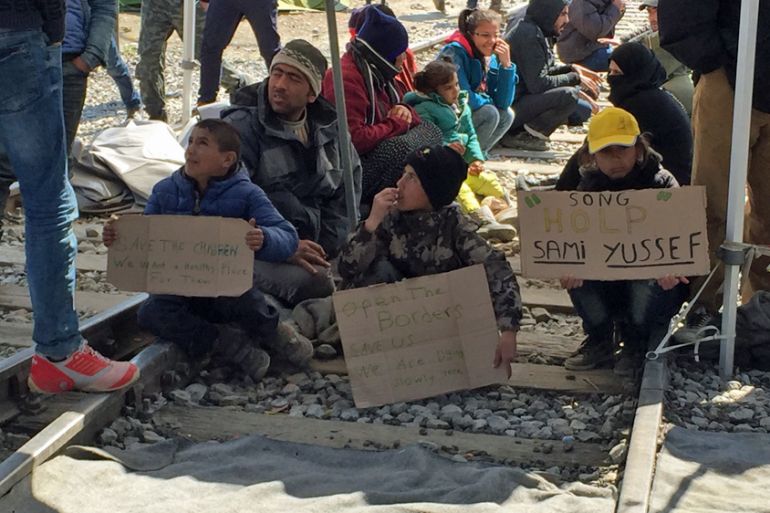A day in Idomeni
Tens of thousands of refugees stuck at the Greece-Macedonia border refuse to move to government-run camps.

I have been to Syria, Iraq, Afghanistan, Pakistan – the countries from where the migrants and refugees stuck at the Greek-Macedonian border come from.
It is not hard to understand why they left, why they risked their lives at sea and why they sold all their belongings to pay smugglers to find a new life.
Keep reading
list of 4 itemsUN report charts lethal cost of migration over past decade
Conflict, climate, corruption drive Southeast Asia people trafficking: UN
Bodies of three Rohingya found as Indonesia ends rescue for capsized boat
But “we are dying slowly here,” is what I heard time and time again in the makeshift camp where over 12,000 people have been living for almost a month.
Conditions are bad and they are getting worse. Tensions are high. People are frustrated and desperate and they are losing patience.
“We didn’t come here to live in a camp,” Moussa Issa from Syria’s war torn city of Aleppo told me.
|
|
“That is why we won’t accept to be transferred to government-run camps. If we leave, the world will forget about us and we could wait for months before we are relocated across the continent,” under a programme agreed to by the EU .
But some have lost hope. A few hundred people have decided to board the buses that will take them to accommodation centres while they wait for their fate.
UNHCR officials told us that the programme is facing logistical challenges.
“The capacity to process is limited but the Greek government is recruiting more people,” Mario Buono, who is in charge of the northern Greece office, said.
But It is not just that, many EU countries are not following through on their commitments.
It has been a difficult journey for these people. Each person has a story to tell but many feel they are not being heard.
Read more: Inside Idomeni refugee camp, nothing left but hope
“We are not animals. We are human beings with feelings and dignity but look at what has happened to us,” Umm Jamal shouted.
There is no doubt that many of them are economic migrants but there are many others who would qualify as refugees.
One young man from Syria is still traumatised from spending almost two months in a government-run jail. “I can’t go back,” Mohammed told us. “I am ready to wait months but just as long I can stay in Europe.”
But time is not on Abu Ahmed’s side. “My wife has been diagnosed with cancer. She is already in Stuttgart. She made it there before me and my three children. Now we are stuck here and I don’t know if I will ever see her. The children still don’t know that she is sick,” 55 year old Abu Ahmed told me before bursting into tears.
It is hard to watch an elderly man cry.
Refugee crisis: Bottlenecked on the Balkan route
Abu Ahmed is from Syria – like the majority of the refugees in Idomeni. He begged us to help him – all he wanted was for those in charge to hear his story.
UN staff members at the camp are overwhelmed by the crisis. But Abu Ahmed believes his case should be treated as a priority.
For now, refugees and migrants have been told to make a Skype call to the Greek Asylum Service to be given a date for an interview.
“Skype call times for applications at the asylum office in Athens: Mondays to Wednesdays 9-10; Friday 9-11 am. Skype calls for applications at the asylum offices in Thessanaloki Monday to Fridays 15-16:00,” leaflets read.
Abu Ahmed knows that thousands and thousands of people like him will be trying to make that call.
![A refugee performs as others hold placards during a protest in a makeshift camp for refugees and migrants at the Greek-Macedonian border near Idomeni [Alexandros Avramidis/Reuters]](/wp-content/uploads/2016/03/bcd66055e4374454848dbc44ca264ced_18.jpeg)